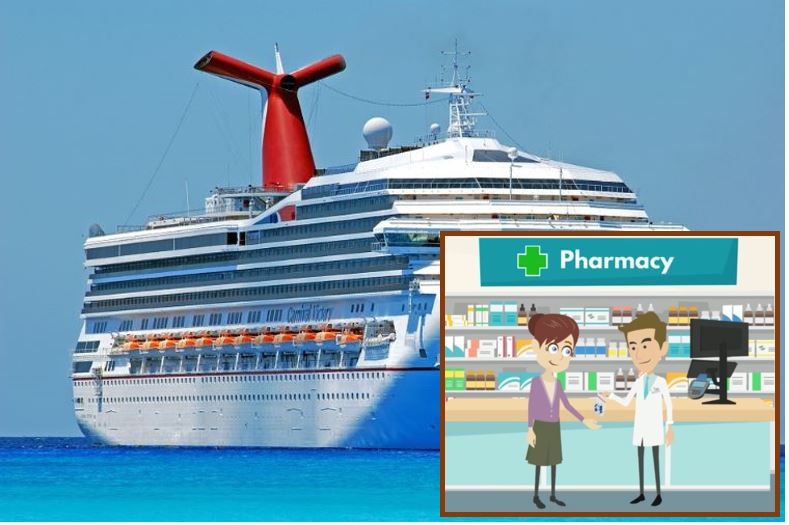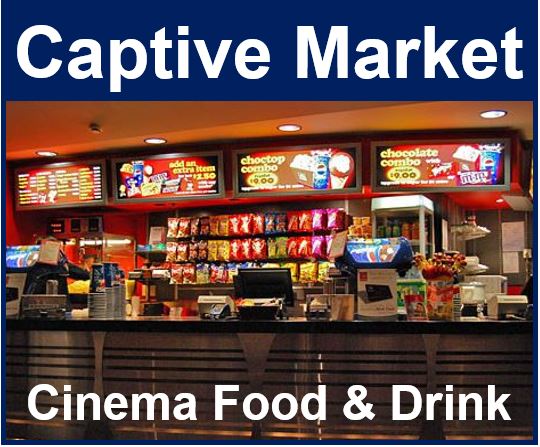A Captive Market is one where the potential buyers have very limited choice. In other words, unless they buy from just one or two suppliers their only other option is not to buy.
In this type of market, the seller has the upper hand. The seller can raise prices without worrying about competitors grabbing its customers.
Captive market on cruise ships

For example, a shop on a cruise ship has no competition. However, passengers still need to buy painkillers, toothpaste, products for babies, and other basic items.
If there is only one shop on the liner, consumers have no choice but to get all their supplies from there.
If you want to eat and drink at the movies, you have to buy their products. Sports stadiums and airports also have this regulation. They do not let you consume things that you bought outside.
To be fair, sellers at movie theaters and cruise ships have to compete with sellers in other movie theaters and ships. However, while the passengers are on board and movie viewers are at the theater, they are are ‘captive.’

Food and drink at the cinema can be ridiculously expensive. As they have a captive market, they can charge what they like.
Captive market – monopolies
In some countries, where there is just one supplier of a product or service, there is a captive market. In Mexico, for example, you can only fill your car with gas (UK: petrol) from a PEMEX filling station.
We call a market with just one seller a monopoly.
Many makers of printing machines have a captive market for toner sales. When you buy the printer, you soon realize that you are stuck with one supplier for your toner.
You cannot buy other toner brands because they do not work on your device. You have become the victim of a monopoly.
Imperfect competition
A captive market is an example of imperfect competition. Imperfect competition exists in a competitive market where some features are not truly competitive.
There are many possible types of imperfect markets such as a monopoly (just one seller), oligopoly (too few sellers), monopsony (just one buyer), or oligopsony too few buyers.
The market for printer toner
Many companies sell devices and subsequently their spare parts or peripherals. The main device is usually cheap, but the follow-up products are expensive. This is because they have a captive market.
In some franchise businesses, the franchisees can only buy supplies from the franchisor.
Captive market examples
1. Airport Shops
Airports are a classic example of a captive market because passengers inside the terminal often have little time or no alternative but to shop or dine within the airport. In many countries, airport retailers ask travelers to show their boarding passes in order to record purchases that may qualify as duty-free or tax-free.
Critics argue these tax savings aren’t always passed along to consumers. Instead, retailers sometimes charge higher prices despite benefiting from tax exemptions or airport-exclusive deals. Passengers, who are effectively “captive” behind security checkpoints, often have no choice but to accept these elevated costs if they want to buy food, souvenirs, or other items before or between flights.
2. Amusement Parks
Amusement parks offer rides, themed attractions, and entertainment—but they also present a closed ecosystem for dining and shopping. Because visitors often spend the entire day within park premises, they have few nearby alternatives for meals, drinks, or souvenirs. Park operators exploit this lack of outside competition to mark up prices on food, beverages, and branded merchandise.
Why It’s Captive
- Guests typically cannot exit and re-enter easily without losing valuable time (or sometimes paying an additional fee).
- Food, snacks, and souvenirs inside the park are often the only convenient options.
3. Stadiums and Arenas
Major sports stadiums and concert arenas also create captive markets. Once fans have entered, they cannot bring in outside food or drinks (as per venue policies) and must rely on the vendors inside for refreshments. Merchandise sold inside is similarly restricted; official team or event-branded items are exclusive, and prices are controlled by the venue’s management or partners.
Why It’s Captive
- Security policies prohibit outside food/drinks, compelling attendees to buy from in-house concessions.
- Exclusive rights or licensing deals drive up the cost of souvenirs and team gear.
4. Hotel Minibars
The minibar in a hotel room is another classic example. Guests who arrive late at night or are too tired to look for alternatives may end up paying steep premiums for snacks, drinks, or other convenience items. The convenience of having a beverage or snack right in the room—and the difficulty of finding a nearby store if one is unfamiliar with the area—creates a captive audience for the hotel.
Why It’s Captive
- Guests may not have the time or energy to leave the hotel, especially if they are traveling for business or arriving at odd hours.
- Prices can be significantly higher compared to regular retail stores, reflecting both the convenience and the monopolized environment.
5. College Textbooks
College students frequently find themselves at the mercy of campus bookstores because assigned textbooks, lab manuals, or supplementary materials are often only available through official or college-approved vendors. Even if alternative editions exist, professors may require specific or custom editions, narrowing the students’ choices.
Why It’s Captive
- Professors and departments often list particular editions, making it risky to buy secondhand or older versions.
- The official campus bookstore is sometimes the only place stocking unique or custom course materials.
6. Software Ecosystems
Tech giants like Apple create ecosystems in users may feel compelled to keep purchasing compatible apps, add-ons, and accessories. Once you commit to a particular operating system your future app and accessory purchases are often tied to that same ecosystem for compatibility and convenience.
Why It’s Captive
- Switching to a different platform can involve high costs, including losing access to purchased apps or data.
- Accessories (chargers, cases, etc.) are often device-specific, further entrenching consumers within a particular brand.
7. Hospital Cafeteria
Patients, their families, and medical staff often don’t have the flexibility to travel elsewhere for meals, especially if they are on call or need to remain near patients. Consequently, hospital cafeterias can charge higher-than-average prices for relatively standard food items, knowing the customer base has limited other options.
Why It’s Captive
- Hospitals are typically located far from other dining choices, or visitors don’t want to leave the premises.
- Staff on shift might have limited break times, forcing them to purchase food in the hospital.
8. In-Flight Purchases
Once an airplane is in the air, passengers looking for refreshments or items like travel pillows are restricted to the airline’s in-flight menu and duty-free catalog. While some carriers offer complimentary snacks or beverages, many charge premium prices for add-ons, banking on the fact that passengers can’t bring certain items through security or simply didn’t plan ahead.
Why It’s Captive
- No alternative shopping environment exists at cruising altitude.
- Strict baggage and liquid restrictions make it difficult or impossible to bring large quantities of snacks or drinks aboard.

